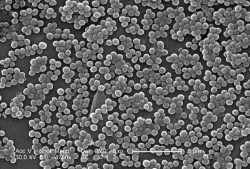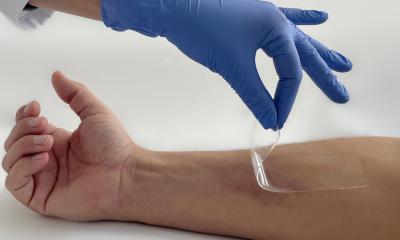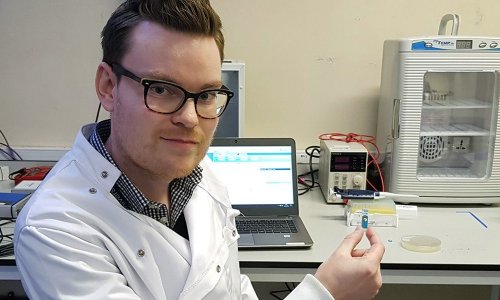A new strain of MRSA discovered
Report: Brenda Marsh
While researching bovine mastitis (an S. aureus infection that occurs in the cows’ udders), researchers led by Dr Mark Holmes at the University of Cambridge, UK, identified a new strain of methicillin-resistant Staphylococcus aureus (MRSA) which occurs both in human and dairy cow populations.


Despite the strain being able to grow in the presence of antibiotics, when the researchers tried to use the standard molecular tests available -- a polymerase chain reaction technique (PCR) and slide agglutination testing – – which work by identifying the presence of the gene responsible for methicillin resistance (the mecA gene) – the tests came back negative for MRSA. The new strain’s genetic makeup differs greatly from previous strains, according to the study findings published in June in The Lancet Infectious Diseases journal.
When Dr Matt Holden and a research team at the Wellcome Trust Sanger Institute sequenced the entire genome (decoding all of the genes in the bacteria’s DNA) they realised that the new strain possessed unconventional DNA for MRSA. They found that the new strain does have a mecA gene but with only 60% similarity to the original mecA gene. Unfortunately, this results in molecular tests (which identify MRSA by the presence of the mecA gene) giving a false negative for this strain of MRSA.
Subsequent research revealed that the new strain was also present in humans. During the study, the new strain was found in samples from Scotland, England and Denmark (some from screening tests and others from people with MRSA disease). It has since been identified in Ireland and Germany. Additionally, by testing archived S. aureus samples, the researchers have also identified a recent upward trend in the prevalence of the antibiotic resistant bacteria.
Dr Mark Holmes said: ‘The majority of MRSA testing in British hospitals is performed by seeing if the bacteria will grow in the presence of antibiotics, typically oxacillin and cefoxitin, rather than methicillin – which is now no longer manufactured. This type of testing detects both the new MRSA and conventional MRSA. However, it is important that any of the MRSA testing that is based on detection of the mecA gene – i.e. PCR based testing, or slide agglutination testing – be upgraded to ensure that the tests detect the new mecA gene found in the new MRSA. We have already been working with public health colleagues in the UK and Denmark to ensure that testing in these countries now detects the new MRSA.’
The new research also raises questions about whether cows could be a reservoir for the new strains of MRSA. ‘Although there is circumstantial evidence that dairy cows are providing a reservoir of infection,’ said Dr Holmes, ‘it’s still not known for certain if cows are infecting people, or people are infecting cows. This is one of the many things we will be looking into next. Although our research suggests that the new MRSA accounts for a small proportion of MRSA – probably less than 100 isolations per year in the UK, it does appear that the numbers are rising. The next step will be to explore how prevalent the new strain actually is and to track where it is coming from. If we are ever going to address the problem with MRSA, we need to determine its origins.’
Scientists at the Health Protection Agency (HPA) co-authored this paper, providing the analysis of the human samples of the new strain. Dr Angela Kearns, head of the HPA’s Staphylococcus Reference Laboratory said: ‘There are numerous strains of MRSA circulating in the UK and the rest of Europe. Even though this new strain is not picked up by the current molecular tests, they do still remain effective for the detection of over 99% of MRSAs. This new strain can be picked up by another type of test, which has shown to be effective in trials in the UK and elsewhere in Europe.’ This is, she added, a very interesting find and, she added: ‘The HPA is currently involved in further research to screen a wider population of MRSA samples to ascertain how prevalent it is. It’s important to remember MRSA is still treatable with a range of antibiotics and the risk of becoming infected with this new strain is very low.’
The first author of the paper, Dr Laura García-Álvarez, who discovered the new strain while a PhD student at the University of Cambridge’s Veterinary School, said: ‘To find the same new strain in both humans and cows is certainly worrying. However, pasteurisation of milk will prevent any risk of infection via the food chain. Workers on dairy farms may be at higher risk of carrying MRSA, but we do not yet know if this translates into a higher risk of infection. In the wider UK community, less than 1% of individuals carry MRSA – typically in their noses – without becoming ill.’
With funding from the Medical Research Council, the researchers will now undertake prevalence surveys in peopleand in dairy cattle in the UK to determine how much new MRSA is present in these populations. They will also be performing an epidemiological study on farms to identify any factors that may be associated with infection by the new MRSA, to look for further new MRSA strains, and to explore the potential risks of the new strain to farm workers.
16.06.2011










